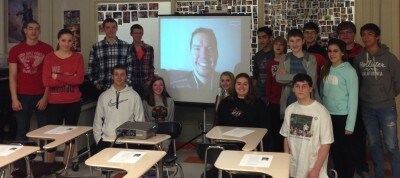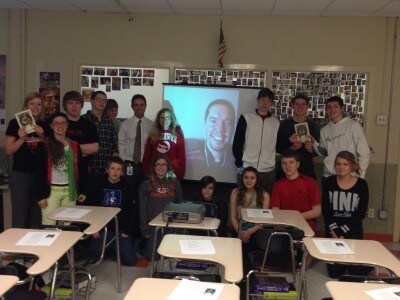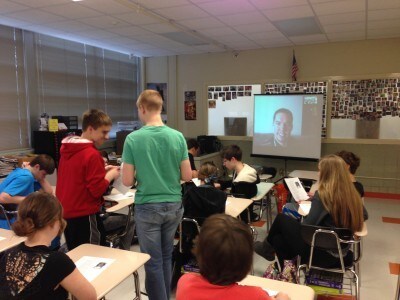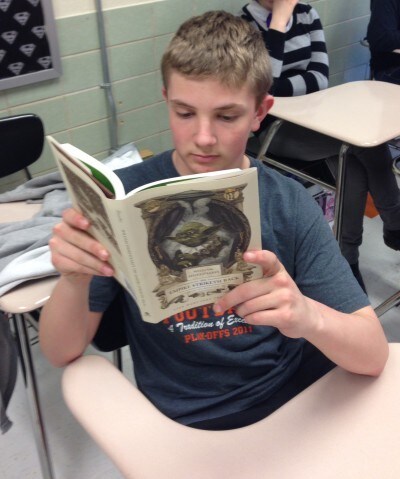The author of The Empire Striketh Back speaks with students about how he connected princesses, Jedi, and smugglers with the works of Shakespeare.
The power of Ian Doescher’s contribution to the zeitgeist of Star Wars culture is a marvelous thing to behold, particularly when it accomplishes something many educators spend a lifetime trying to accomplish: getting students to invest in the power of Shakespeare’s figurative language. This was on display in my classroom recently, as Ian visited my freshmen students via Skype to discuss his contributions to Star Wars literature, William Shakespeare’s Star Wars and The Empire Striketh Back.
Ian is, naturally, no stranger to talking about his love of Star Wars and Shakespeare, and his passion was evident as he spoke to my classes of how this creative process began. He informed students what iambic pentameter is, and how he incorporated Shakespeare’s writing style into Star Wars vernacular.

The Force was certainly strong with Ian, as he made connections between some of Shakespeare’s classic scenes, and illustrated their influence on his writing. He proceeded to read the St. Crispin’s Day speech from Henry V (IV, 3, 18-67), and explained how this inspired Luke Skywalker’s rousing speech to the fledgling Rebellion before the attack on the Death Star (V, 4, 65-103). Both speeches motivate their respective armies, and Ian was starting to motivate my students to see the connections between two legendary storytellers. Who knew William Shakespeare and George Lucas had so much in common? At least, that was what some of my students started to think.
Next, we transitioned to visual imagery, as Ian shared a sample of Hamlet’s stirring speech concerning Yorick, the King’s deceased court jester. Even the most ardent Shakespeare naysayer is aware of the scene where Hamlet holds aloft a skull and utters, “Alas, poor Yorick! I knew him, Horatio…” (V, 1, 99-99). Ian pantomimed holding a skull, and read an excerpt of this dramatic moment; the students were transfixed. He then went back to William Shakespeare’s Star Wars, and shared the scene where Luke Skywalker, having been freed from the Trash Compactor, removes the Stormtrooper armor that served as his disguise, and reflects on what may have been of the previous owner of the iconic white armor.

Once again, students were asked to make connections, and the results were efficacious for both myself and Ian. There is nothing more thrilling for an educator than to see your students make connections between your curriculum and the modern world. Naturally, for Star Wars fans like Ian and me, this was terrific, as the power of language and storytelling comes to life through the brilliant mash up of Shakespearian linguistics and Lucas’ characterization. The Empire Striketh Back, indeed.
Naturally, Ian wasn’t done entertaining my students. In each of his three presentations, he performed Obi-Wan Kenobi’s final soliloquy, as the esteemed Jedi sacrifices himself to save the son of Skywalker. However, for this scene, he read as Sir Alec Guiness, and it sounded great! James Arnold Taylor would have been proud, and my students were pleased as well. As I walked around the classroom, students were engaged, attentive, and ready for more of Ian’s insights and revelations about the making of these books. One of my classes even got to hear his Yoda impression, as he explained his decision to write the Jedi Master from Dagobah in haiku for The Empire Striketh Back. Truly, it was as if Tom Kane or Frank Oz was present. Students were quiet for most of the presentation, but when Ian spoke as Yoda, the room erupted with applause.
One of the great joys of having Ian come in to talk to my students about Shakespeare was that, in order to prep them for the Skype appearance, we had to watch The Empire Strikes Back. There are far worse things than watching Star Wars in school, and even those of my students who had never seen a Star Wars film couldn’t help but find enchantment through the interactions of Han Solo and Princess Leia. One student proclaimed, “I like them together. They are so cute!” As I asked students to evaluate the characteristics of the scoundrel from Corellia and the Princess from Alderaan, I shared with them that they would get a chance to act out this scene, Shakespeare style, during Ian’s appearance.

Getting volunteers was not difficult for this, but deciding who to choose was, as many were eager to perform this scene for the author. Once we narrowed down our choices, the select volunteers were ready to perform a reader’s theater-style performance of a pivotal scene in Han Solo and Princess Leia’s courtship. The scene is legendary to Star Wars fans: Leia calls Han a scoundrel, to which Solo replies, “I like that word, when spoken from your lips” (III, 1, 114), and the students read the dialogue with enthusiasm and aplomb. It was wonderful to see everyone having such a positive experience sharing Star Wars and Shakespeare in a high school classroom setting, and Ian was having as much fun as any of us.
Ian closed the presentation by inviting students to ask questions to the author, and hands starts to rise, one by one. At first, students were somewhat reticent (a few even mentioned they were a tad nervous), but once they saw how personable Ian was, the atmosphere became more conversational in tone. Questions ranged from “How long did it take you to write the book?” to “What inspires you to write?” and “How excited were you when the book was published?” Ian answered each question with a smile, and addressed each question with insight and honesty. Students were empowered and engaged, and Ian had a wonderful time.
It’s not every day that you get to interact with a New York Times bestselling author, and Ian was gracious with his time, sincere with his answers, and everyone was enthralled. As an educator, this is my goal with each lesson. In addition, I was able to combine two of my passions, Star Wars and education, with my students, and all of us are better for the experience. A huge thank you to Ian Doescher for sharing his talents with us!
Dan Zehr is a high school English teacher with an MS in Teaching and Learning. He also runs Coffee With Kenobi (with co-host Cory Clubb), a Star Wars podcast that analyzes the saga through critical thinking, analysis, interviews, and discussion.


